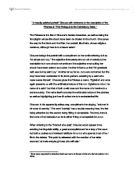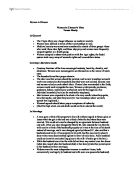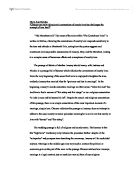"A heavily satirical portrait" Discuss with reference to the description of the Prioress in "The Prologue to the Canterbury Tales."
"A heavily satirical portrait" Discuss with reference to the description of the Prioress in "The Prologue to the Canterbury Tales." The Prioress is the first of Chaucer's female characters, as well as being the first pilgrim whose life should have been dedicated to the church. She paves the way for the Monk and the Friar, her portrait, like theirs, shows religious deviance, although hers is to a lesser extent. Chaucer beings the portrait with a compliment on her smile referring to it as "ful simple and coy." The adjective themselves lend an air of naivety to her description but nuns should not smile and the adjective most suiting her should have been solemn and sober. He then informs us that "hir greeteste oath was but by seint Loy." Another sin as far as nuns are concerned but this may have been overlooked in its ironic gesture, swearing by a saint who never swore himself. Chaucer gives the Prioress a name, "Egletine" and once again presents us with the antithetical nature of this nun. Egletine is not a the name of a saint1 but that of both a wild rose and the name of a heroine in a romance story. The name itself connotes the whimsical nature of the prioress as well as highlighting just how ill-suited she is to ecclesiastical life. Chaucer, in his apparently artless way, compliments her singing, "entuned in hir nose ful semely." The word "semely" has a double meaning
In this paper I am going to deal with Dryden and his essay Preface to the Fables.
JOHN DRYDEN The epoch associated in England with the name of Augustan or Classical was an age of dominant intellectualism, a hard and sterile period. Dryden and Pope were the two prominent literary figures who lived during this age and carried out innovations in the field of literature. In this paper I am going to deal with Dryden and his essay Preface to the Fables. Samuel Johnson in his Lives of the Poets says Dryden's " contemporaries, however they reverenced his genius, left his life unwritten; and nothing therefore can be known beyond what casual mention and uncertain tradition have supplied". Thus much details about Dryden's life is not known except he was born on August 9, 1631, at Aldwincle near Oundle, as the son of Erasmus Dryden of Tichmersh . Johnson further says that " Dryden may be properly considered as The Father of English Criticism, as the writer who first taught us to determine upon the merits of composition". Even great critics from Santisbury to T.S. Eliot acknowledged this. Though Dryden tried his hand in other forms of literature like poetry and drama and equally excelled in them, he is best known for his political satire and literary criticism. Energy and driving force, the English virtues are indeed, a general merit of the verse of Pope and Dryden says Sri Aurobindo in his The future of Poetry.The poetry of Dryden is vigorous and forceful. He
After reading Chaucer's "General Prologue" I can clearly see that the way in which Chaucer presents "frankelyn" and the "millere" are very different. Throughout the prologue
Write a comparison of the presentation of at least two of the pilgrims from Chaucer's "General Prologue." After reading Chaucer's "General Prologue" I can clearly see that the way in which Chaucer presents "frankelyn" and the "millere" are very different. Throughout the prologue we can see more of favouritism towards Frankelyn and we can definitely say that Chaucer likes Frankyelyn more than the Millere. Frankyelyn is one of the highest class people on the pilgrimage other than the knights; He is continuously referred to as generous and noble. "It snewed in his hous of mete and drynke" "Ful many a fat partrich hadde he in muwe, And many a breem and many a luce in stuwe." "Was nowher swich a worthy vavasour" And on several occasions he is referred to the colour white which represents purity and innocence. "Whit was his berd as is the dayesye" "whit as morne milk." These references to the colour white and naturalistic images are used to create a positive effect towards Franklyn. However the Miller is the complete contrast. We can see quite clearly that Chaucer doesn't like the miller, he is portrayed as a low class middle man who is gruesome to look at and a crook. "Upon the cop right of his nose he hade A werte, and theron stood a toft of herys, Reed as the brustles of a sowes erys;" Here Chaucer also uses naturalistic imagery but not in the same way as he does for
Women in Chaucer's Time Teresa Eberly
Women in Chaucer Women in Chaucer's Time Teresa Eberly In General * The Virgin Mary was a huge influence on medieval society. * Women were defined in terms of their relationships to men. * Medieval society was sometimes considered to consist of three groups: those who work, those who fight, and those why pray-and women were frequently lumped together as a fourth group. * Women occupied a subservient position with few legal rights; the feudal system took away many of women's rights and lowered their status. Courtesy Literature Ideals * Courtesy literature of the time encouraged modesty, humility, chastity, and obedience. Women were encouraged to see themselves in the mirror of men's eyes. * The household was their proper domain. * The ideal was that women should be isolated, and in rural townships women's work was centered on the household (but they were not isolated, because men and women relied on each other's labor. If more labor was needed in the fields, women would work alongside the men. Women as dairymaids, poulterers, gardeners, bakers, and brewers worked not only for the supplies of an individual household, but also for marketable surpluses). * Ideal women were expected to be silent or be very careful when they spoke, how they spoke, and what they said. (Ex: two townships where women's speech was legislated.) * Women's speech should show proper
Notes on geoffrey chaucer's life and the pardoner's tale.
NOTES ON GEOFFREY CHAUCER'S LIFE AND THE PARDONER'S TALE Chaucer's life Chaucer lived in the 14th century. He wrote poetry for society's most rich and powerful people. When he wrote the Canterbury Tales he encapsulated the entire spectrum of modern life up to 1400. From the records that were found it is thought that Chaucer was born around 1344. In 1359, at the beginning of the Hundred Years' War, the French took Chaucer prisoner. He was released after the King paid £16 for his discharge (this proves him to be of great importance to society). It is thought that he may have returned to study law at the Inner Temple, as a wide knowledge of this subject is shown in his later work. However, by the time Chaucer was in his twenties he held the position of a Squire at the Royal Court, which was a middle ranking position. French was spoken a large amount of the time at court and Chaucer would have believed it to be the language of gallantry and enlightened society. Chaucer was, once again, in France in 1370. It is therefore obvious that French was a substantial inspiration in his work. The king asked Chaucer to visit Italy, Genoa and Florence (in 1372 and 1378). This was a very influential time for Chaucer, in the context of his poetry, as he was exposed to some of Italy's greatest literary works. He was greatly inspired by Boccaccio (1313-75) and Petrach (1304-74), who he is
Character Analysis: The Clerk In Geoffrey Chaucer's The Canterbury Tales.
Panzarella 1 Jillian Panzarella CP English 12 Mrs. Costanzo January 7, 2003 Character Analysis: The Clerk In Geoffrey Chaucer's The Canterbury Tales, of the narrator's twenty-nine companions, few of them are described without criticism or irony. Chaucer delights in applying one, or even several, of the seven deadly sins to his fellow pilgrims while choosing a select few to represent ideals and set standards for the rest of the debauched passel. Among the pilgrims is a student, a Clerk, a character that, Chaucer feels, portrays the archetype of the dedicated student. The Clerk is unconcerned with material possessions or a worldly appearance, he is fiercely dedicated to learning and study, as well as soft-spoken, speaking only what and when it is relevant and necessary. In the general prologue the portrait of the Clerk fiercely contrasts that of the Merchant (Rossignol, ). The Merchant's opulence and acquisitiveness allow one to more ably notice the Clerk's poverty and devotion to "enriching his mind rather than his pocketbook" (Rossignol, ). The Clerk is introduced by mention of the near-emaciated thinness of both he and his horse. His clothing was threadbare and his face was gaunt (Chaucer, Prologue to The Canterbury Tales). The Clerk's appearance
Transportaion and parking investigation.
Jack Gammon 5 matt Contents Page 1 Front page Page 2 Contents Page 3 Introduction (hypotheses and study area description) Page 4 Introduction (hypotheses and study area description) Page 5 Introduction (hypotheses and study area description) Page 6 Introduction (hypotheses and study area description) Page 7 Introduction (hypotheses and study area description) Page 8 Introduction (hypotheses and study area description) Page 9 Introduction (hypotheses and study area description) Page 10 When and where (identify and methodology) location map Page 11 When and where (identify and methodology) Sector model diagrams Page 12
'Langland's Piers Plowman greatly influenced The Canterbury Tales'. Discuss, with particular reference to estates satire and narratology.
'Langland's Piers Plowman greatly influenced The Canterbury Tales'. Discuss, with particular reference to estates satire and narratology. Although the themes and preoccupations of The Canterbury Tales1 and Piers Plowman2 are entirely different, both poets seem to have a shared interest in individual human characteristics and variety. The way in which they express these common interests is dissimilar, yet there are certainly comparisons which lead many to believe that Langland influenced Chaucer. As a slightly younger contemporary of Langland, it is entirely possible that Chaucer would have had access to The Vision of Piers Plowman. The B-text of Piers Plowman is generally dated in the mid-1370's, with The Canterbury Tales commonly held to have been written between 1388 and 1400. It is likely that Langland also lived in the same area as Chaucer for a while: 'And so y leve yn London and opelond bothe' (C-text, V. 44). Even if we can assume that Chaucer had read Langland's work, it is unclear to what extent it would have influenced him as there are no references to him in any works attributed to Chaucer. The greatest similarity between the two poems is the estates material which they employ. The feudal system promoted a marked separation of the classes in society and emphasised the need for each class or 'estate' to contentedly fulfil their given role, whether that be
Chaucer not only ridicules tale conventions of courtly love but challenges the concept of love itself" "The Merchants tale" like many of the tales within "The Canterbury Tales"
Mary-Ann Moloku "Chaucer not only ridicules tale conventions of courtly love but challenges the concept of love itself" "The Merchants tale" like many of the tales within "The Canterbury Tales" is written in Fabliau, ridiculing the conventions of courtly love responds sensitively to the tone and attitude in Merchant's Tale, noting how the poetry suggests and counteracts various possible assessments of January, May, and the Merchant, leading to a complex sense of humorous effects and conceptions of courtly love. The passage of debate of whether January should marry, with Justinus and Placebo is a passage full of humour which ridicules the conventions of courtly love. From the very beginning of the scene field lexis is employed to heighten the tone, evidently January has married May for "gret ease and lust in marriage". At the beginning, January's words connotates marriage as either sexual "whan him lust" has lead him to find a woman of "fair schap and fair visage" or as a religious connotation "to lede in ease and holynesse his lyf". Despite the sexual and religious connotations of this passage, there is no simple connotation of the most important element of a marriage, simply love. Chaucer ridicules this passage as January, does not attempt to adhere to the usual courtly romance procedure meaning he is not in love but merely in love with "beaute" and "fair schap". The
Chaucer's Favorable Treatment of Women's Plight for Equality
Chaucer's Favorable Treatment of Women's Plight for Equality Joe Bohn 303W-01 Christian Moraru June 17, 2000 Joe Bohn English 303W-01 Chaucer's Favorable Treatment of Women's Plight for Equality Throughout Geoffrey Chaucer's "Canterbury Tales," characters are depicted which epitomize and exaggerate the corruption and injustices commonly experienced during his lifetime. Chaucer explicitly utilizes his characters as instruments, which serve to ponder taboo subjects of the times. Amongst these taboo topics, he makes his strongest points by portraying Alison, the Wife of Bath, in order to shed light upon the plight of medieval woman's oppression. Chaucer urges his audience to consider and reconsider patriarchal society's treatment of women. First, we must recognize that Chaucer had much reason to sympathize with the plight of women. According to a 1357 record-made when he was approximately fifteen years of age-young Chaucer was employed by a wealthy count. That Christmas, the countess showed him great kindness by providing him with a generous amount of money, such that young Geoffrey could buy himself clothing and other items (Beidler 4). Clearly, this generosity would have left a mark upon him at such an impressionable age. According to an ambiguous legal record, there was another instance in which a woman showed kindness to Chaucer. In his later life, he was











